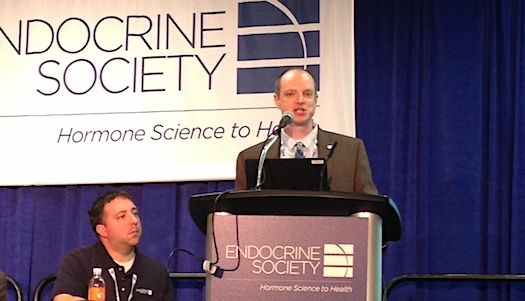Article
Using Telehealth to Spread Expertise for the Treatment of Rural Diabetes
Author(s):
A project from the University of New Mexico looks to turn physicians to experts.

Matthew Bouchonville, MD, an endocrinologist at the University of New Mexico, puts the problem plainly.
“Diabetes is a manageable condition. We could actually prevent all of the complications of diabetes. That said, the reality is that today in the United States, nearly half of the population with diabetes has uncontrolled diabetes. This is nearly 15 million Americans…and these are often the ones with more complex diabetes,” he says.
“The problem is, we don’t have enough diabetes specialists in this country, and in fact, we’re short about 1,500 endocrinologists.”
In a news conference at ENDO 2017, the 99th Annual Meeting of the Endocrine Society, Bouchonville (pictured above) introduced his state’s efforts to combat such personnel limitations. Project ECHO, which stands for “Extension for Community Healthcare Outcomes,” is a telehealth service in New Mexico that seeks to upskill the state’s physicians through video conferences with experts. It began in 2003 to spread better knowledge about hepatitis C care to physicians throughout the state, and a 2011 study published in the New England Journal of Medicine showed that “rates of sustained virologic response in our ECHO cohort…were similar to those among patients in the study's comparison group, who were treated at an academic medical center.”
Of the 33 counties in the state, only 4 of them contain endocrinologists, with the bulk of the state’s diabetes specialists centered around Albuquerque. Such a dearth creates a strain on the existing specialists, and for patients can result in long wait times and sacrifices like long drives and missed work. The University of New Mexico launched Endo ECHO to specifically find out if the improvements in hepatitis C treatment that they had seen with the initial project could be replicated for the diabetic population.
“What if instead of moving these patients into the diabetes specialty clinic, we move medical knowledge out to the underserved communities?” Bouchonville asked.
The virtual clinics are held weekly, with a team of specialists on one end and an audience of healthcare workers on the other, including nurse practitioners, physician’s assistants, physicians, and community health workers. The experts present de-identified case situations for discussion and training.
“In the process, these providers learn new best practices, and they become part of an ongoing community of knowledge-sharing and mentorship, such that over time they actually gain the expertise, skills, and confidence to manage patients with complex diabetes,” he explained positively, before diving into the results of a study the group had run to see how their program was working.
In the study, primary care providers (PCPs) and community healthcare workers (CHWs) who had received 16 months of Endo ECHO training took surveys to gauge their confidence in their ability to treat patients with complex diabetes. They had also taken surveys at baseline.
“We looked at a number of diabetes care areas, for example, for community health workers specifically, we assessed their confidence level and their ability to advise patients on self-care and motivating behavioral change…for the primary care providers, we assessed their confidence in their ability to manage complex insulin regimens, screen for diabetic complications, and serve as an endocrinology resource for other clinicians within their communities,” he said.
Their surveys turned up what Bouchonville called “significant improvements across the board.” The confidence surveys ran on a scale of 1 to 7, and overall self-efficacy scores shot up from a mean of 2.59 at baseline to 6.02 at 16 months among CHWs, and from a mean of 3.66 to 5.84 among PCPs. Bouchonville quoted a few doctors from his state glowing about Endo ECHO’s impact on their ability to care for diabetes patients.
“They’re feeling like they can do this, they don’t need to send their patients out hundreds of miles to see a specialist, they can manage them in their own communities,” he said.
The study, he noted, doesn’t gauge patient outcomes, though there is an ongoing evaluation of about 900 patients in the program that should yield data sometime in 2018. ECHO, he says, is an inexpensive program, and unlike direct doctor-to-patient telemedicine, this use of the technology is “capacity-building.”
Currently, there are over 100 different ECHO hubs for various diseases around the world, serving populations in 21 countries.




